The killing of Rahul Bhatt triggered unending protests by Kashmiri Pandits who are serving the government across the Valley under a special package. Khalid Bashir Gura met the community members to understand their concerns, anger and the expectations
More than a week after revenue clerk, Rahul Bhatt’s killing, Kashmiri Pandit (KP) protests refuse to die down. On a balmy May morning, KPs gather near an alfresco Park in Srinagar’s Badamibagh, under the canopy of a Chinar, lighting candles around the garlanded photograph of a slain clerk and raising slogans against the administration.
Fail Hai Fail Hai, Administration Fail Hai (administration has failed in giving us protection). Though symbolic and small, it is the message that emanates from these sit-ins that matters more.
Bhatt, a KP, was posted in the tehsil office in Chadoora, when two militants barged inside his office on May 12 and shot at him from point-blank. He was rushed to the hospital and later referred to SMHS in Srinagar where he was declared dead. Appointed by the Jammu and Kashmir government under the Prime Minister’s Special Recruitment Package in 2010, Bhatt has been in Kashmir for all these years. He was transferred from Budgam to Chadoora barely two years back.
His killing has triggered a wave of fear in the community en masse. They say they shudder to think of rejoining their duties back or even moving out of their residences. The protestors demand relocation till “normalcy” returns in Kashmir. “Even if someone whips out a slip out of his or her pocket we get scared,” a protesting KP said.
One of the non-PM Package employees posted at Jammu addresses the Srinagar protestors stating they are suffering. “My wife is posted in Kashmir and I am worried. My eyes are damaged after the protests. I am happy, we were canned, and teargassed as it helped highlight our plea. Sitting under Chinar shade will not help,” he exhorted employees to remain united amidst divisive strategies deployed to spoil the “movement”.
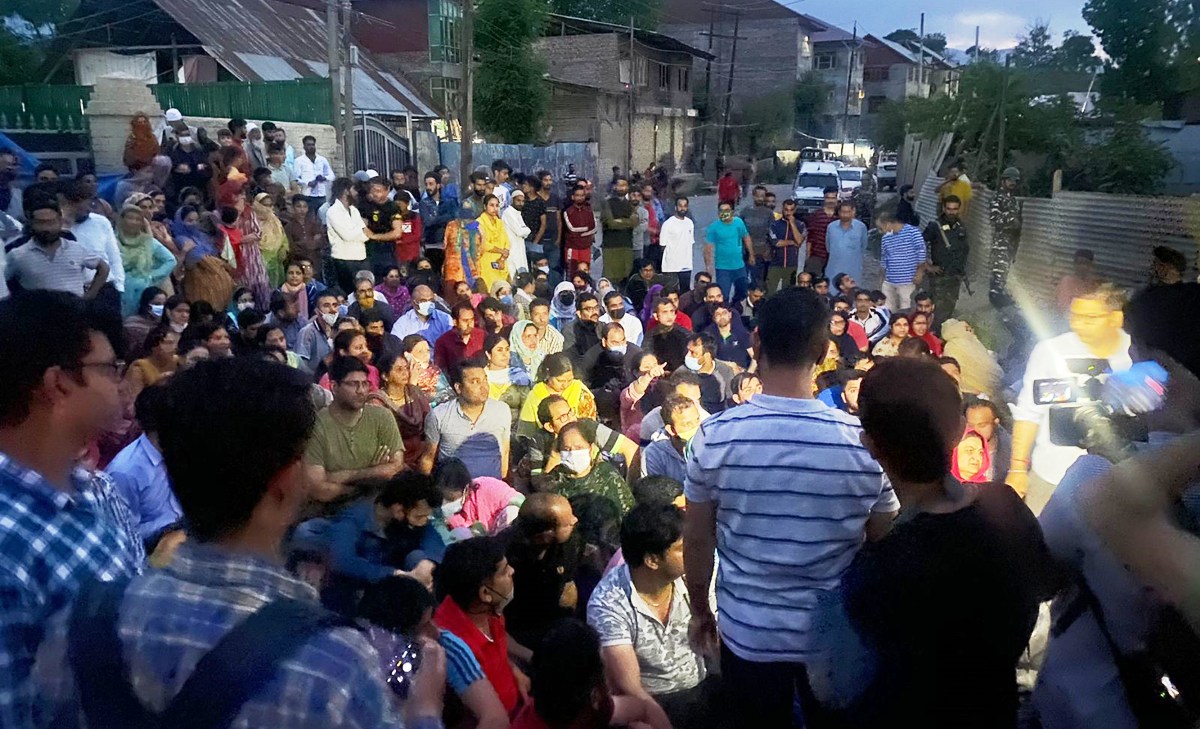
PM Package
After years of thought process, the policymakers found the number of KPs in Jammu and Kashmir government dwindling to the lowest ever. In the follow-up, it was decided to have special recruitments that will encourage them to return home. The Rs 16000 crore, Prime Minister’s Rehabilitation Package was rolled out in 2008 by the then Prime Minister Manmohan Singh.
“Initially 3,000 posts were announced during UPA government and 3,000 more were added later by his successor, Narendra Modi,” said one of the protesting employees.
Jobs apart, the scheme envisaged constructing transit camps for returning migrants. Last year, the government informed the Parliament that nearly 3,800 Kashmiri migrants have returned to Kashmir since the 1990s and 520 have returned since the abrogation of Article 370 to take up jobs under the package.
Official statistics suggest 1025 dwelling units have already been constructed, 1488 are under construction and land has been identified for about 2444 more units across Kashmir.
“Out of 6000 only 1050 got accommodation,” one KP employee said. “The majority of us are forced to live in rented accommodations. We are drained financially. Insecurity hovers over us. We also travel long distances on a daily basis, for work.”
Relief and Rehabilitation Commissioner, Migrants, Ashok Kumar Pandita said the government will complete the construction of transit camps by 2022.
Avinash, one of the employees alleged the government claims were hollow as most of them live in rented spaces. “Rather than transit camps which are meant for military forces and yatris’ government should provide accommodations and create a sense of security,” he said.
In the wake of a spree of killings, especially late last year, many migrant KP’s working in different departments are demanding that they be relocated outside Kashmir till the security situation improves back home. In less than a month, Bhatt became the third to fall to bullets. On April 6, the government informed the Parliament that as many as 14 Hindus including KPs were killed after the abrogation of Article 370.
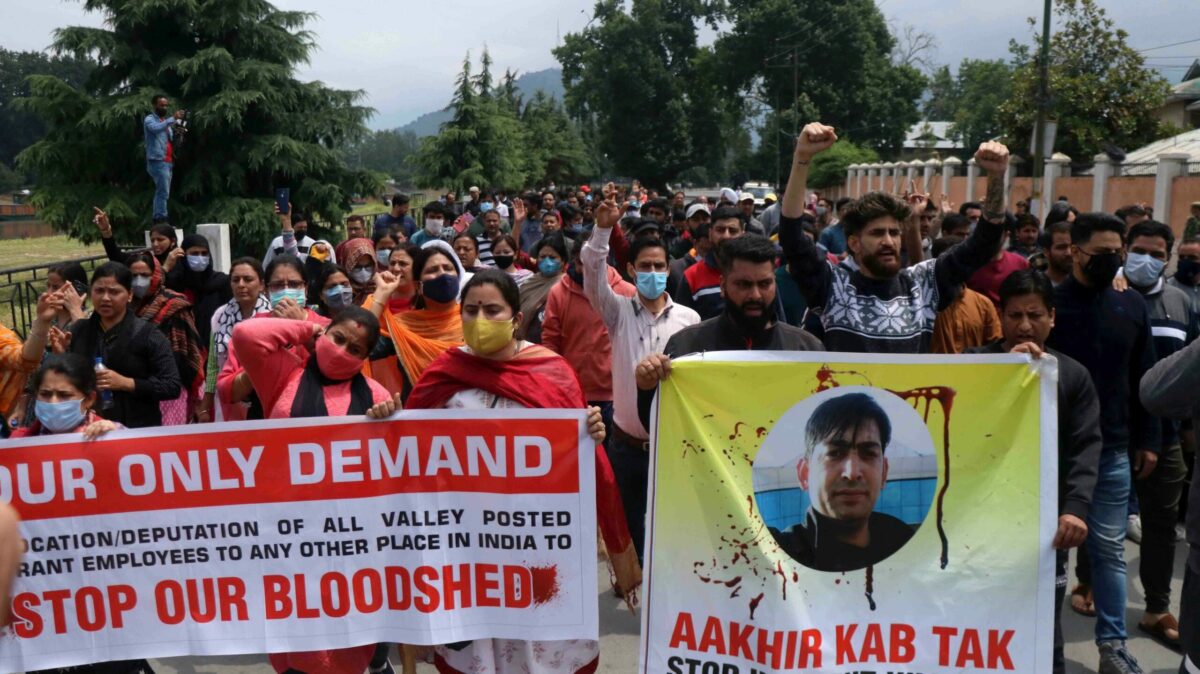
“Last year the Principal and a teacher of a government school in Srinagar were shot dead inside the school. The target killing has mentally distressed us. We cannot work freely as we live in fear,” another employee said, insisting he now suspects every stranger to be his potential killer. “If Tehsil office is not secure what will others working in different departments do? If the government cannot fulfil our relocation demand, we are submitting our mass resignations.”
The demand for doing away with a written bond (making their stay in Kashmir mandatory and serving in all 10 districts of Kashmir) under the Package should be declared null and void as law cannot be above life. “We are prepared to work tirelessly and with dedication but we don’t want to die of bullets,” he said.
Sense of Insecurity
A female teacher posted since 2017, was a toddler when her family from Habba Kadal migrated to Jammu during the early 1990s. “I have been posted at Zevan and live in rented accommodation. I never felt unsafe at my workplace or during travel. But these target killings have instilled a sense of fear,” she said.
As the government is assuring employees of providing and enhancing security, she questioned that their social life is getting impacted. “How can the government provide security to 6000 KP’s? I have to go to market, and go to school with kids, have my social life. Will security officials follow us everywhere? The security officials are themselves not secure? We have to live free of fear,” she said.
A few years ago what motivated her to come back was reconnecting to roots and a sense of security. “Our parents came back to roots because of us. But these targeted killing from last year has instilled fear again,” she said, insisting that she has never faced problems with Kashmiri society after her return but the killings have instilled fear. “Many who have been hired in 2010 are living in rented accommodations so do I. I pay Rs 18000 rent,” she said as she lives in Sonwar which she considers a safer place to live.
Similarly, Avinash has not been able to get accommodation. He said that he has to pay Rs 10000 to the landlord every month. Avinash said, as long as we are breathing we have no value. “Once we die, the government gives compensation and jobs,” he said.
Civil Jails
Outside the migrant colony Sheikhpora, Budgam, security forces guard the colony. A few days after Bhatt’s killing – who lived in the colony with his wife and daughter, the colony residents had taken a protest towards Srinagar International Airport and were canned and tear-gassed by police to foil the march. Lt Governor, Manoj Sinha later announced an investigation into the use of force against the protesting KPs.
“We are not allowed to move out freely. Our children are getting adversely impacted. Some people are not happy with our return,” said Avinash, serving the Roads and Building department and putting up at Transit Camp, housing 350 families. According to Avinash, who had returned in 2010 with his family, the community is not secure irrespective of the layers of security forces deployed by the government. “It is a joke by the government to provide Rs five lakh and class fourth job. It is a forced compensation by the government to Rahul’s family.”
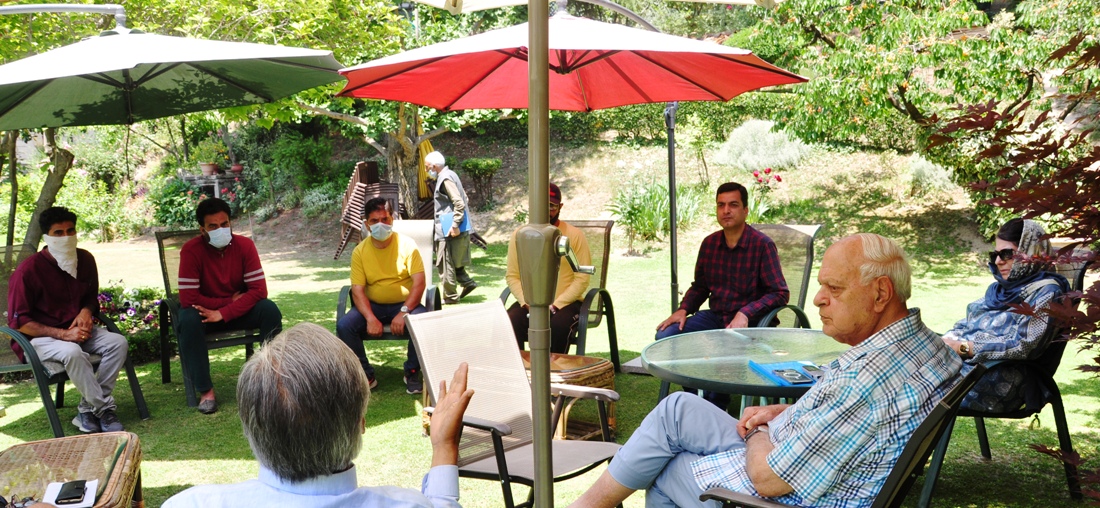
He questioned why Bhatt was shifted from Deputy Commissioner’s office to Tehsil office ignoring his pleas to stay back. The DC offices across Kashmir’s 10 districts are better secured in comparison to the peripheral offices.
“After the October killing, the government had assured of security, however, the targeted killings continue. For how long will we live in fear of death? At school, my focus remains on board as well as any stranger unlocking the gate. This is mental harassment,” said Ajay Wali, 41, a school teacher posted in Srinagar and putting up at Budgam’s transit camp. Wali, before migration, was a resident of Srinagar’s Barbarshah. “If militancy is down why are such terror attacks taking place. We agree with IGP’s and Divisional Commissioner’s assurances that our moving out of Kashmir will boost the morale of militants but what about our lives and people posted in far-flung areas?”
Down South
At Anantnag’sVessu camp there are around 400 families. When Raina, in his 40’s, an engineer in PDD returned home, prefabricated sheds on sharing basis were given to them. However, during the BJPDP coalition government, the work on concrete buildings started, however, it was given to blue-eyed candidates. “Some people who have been struggling for almost a decade have not been able to find a quarter whereas Sarpanchs and others were able to avail it,” he claimed.
Since October 2021, a deep sense of insecurity has taken hold of us. “We are not comfortable in offices now. A kind of psychosis has been created in us. We cannot work properly in fear. If someone takes a slip out of pocket, we presume it is a weapon,” Raina said.
Like many others, urging the government to find a one-time solution, he said that we do not want to become scapegoats. “Except Kashmir, we are ready to give duty anywhere in the country,” he said as he rues that for almost a week our kids are not going to school.
In North
Similarly, TN Pandita, from Baramulla’sVeerwan Camp demanded that until a sense of security is guaranteed we will not resume duties. A non PM package employee said that there are around 160 families in the transit camp and almost 150 live-in accommodations. “ I have been in Kashmir since 2000 serving judiciary as an accountant. Earlier we were secure but after the abrogation of Article 370 things changed for the worst, especially since October 2021,” he said. “The transit camps are civil jails. This is a government’s failure as until now a sense of security has not been created. If there was normalcy we may have returned to our homes.”
Pandita said transit camps lack even basic amenities. This is despite the fact that people from the majority community are standing shoulder to shoulder in times of crisis.
Another employee from the finance department, Ashu is living in a rented accommodation among locals in Srinagar. “The situation is like the 1990s. Such killings are disturbing for any society,” he said.
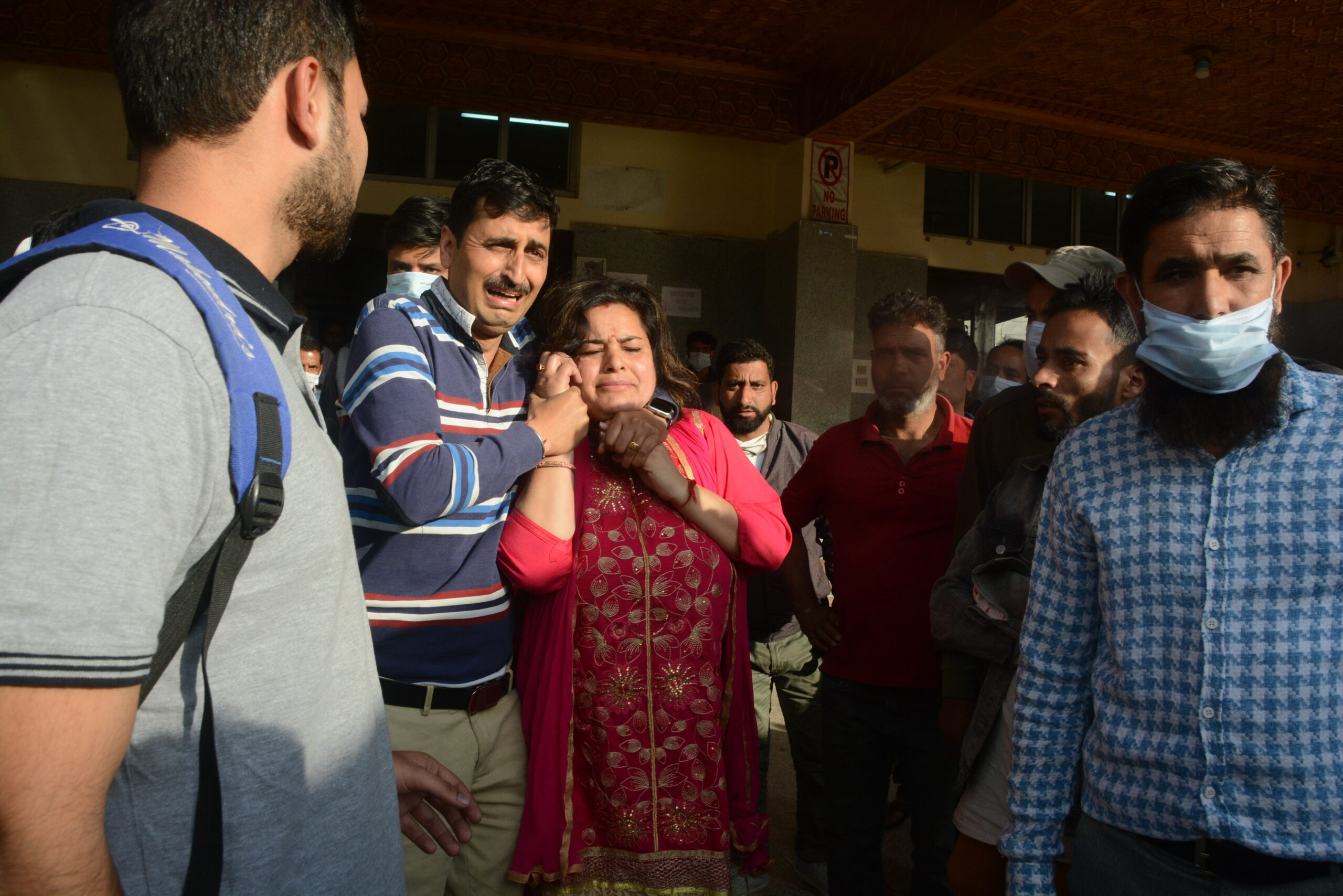
At Kupwara, Satesh Raina, who heads the migrant colony residents said that they also protested. “There are around 500 employees in Kupwara of whom 130 live in the colony. A non-PM Package employee, I came back from Delhi to my homeland and work as a head assistant in the education department,” he said, insisting holding the host public responsible for this is wrong as they are themselves unaware.
In Jammu
In Jammu, the refrain is that the government has failed the community and used KPs for their own political interests since the onset of the tragedy.
Shadi Lal Pandita, 64, originally from Baramulla has lived in Jammu since the 1990s, said that the government has failed to protect the community contrary to its claims, that after abrogating Article 370 and 35A, militancy will be wiped out.
“It was BJP’s government in the 1990s which were in government when we had to flee,” said Pandita. “We had to suffer due to snake, scorpion bites and heat. We were suddenly thrown into a different culture and climate.”
KPSS
Sanjay Tickoo heads the Kashmiri Pandit Sangharsh Samiti (KPSS), the organisation of the Pandits that stayed put in the 1990s. Their number is below a 1000-family.
“The way Bhatt was killed inside his office and his colleagues failed to protect him make KP’s feel more vulnerable and scared. The bond signed by employees has made them bonded labours,” Tickoo said putting the onus on the majority community for protecting the minority. He questioned the silence of the majority community over the killings.
Tickoo said there are around 9000 KPs living in Kashmir including those who availed of the package and returned to serve Kashmir. He also denounced the circulation of threat letters on social media. As a society, he believes that we failed to condemn the killings. According to him, these killings cannot happen without the logistical support of the locals especially OGWs who help gunmen to kill KPs.
He also questioned the normalcy narrative peddled by the government by conflating it with a footfall of tourists.
Collective Condemnation
Cutting across party lines, the political class denounced the killings. “This young man had his entire life ahead of him & to know that his life was so cruelly extinguished today is tragic,” Omar Abdullah wrote on Twitter. PDP president, Mehbooba Mufti said that the killing belies the false claims of normalcy in Kashmir.
Similarly, JKPCC President Ghulam Ahmad Mir and various other party leaders expressed deep shock over the killing. They said the security situation has worsened to the largest extent in Kashmir while slamming the Govt for failing to ensure the safety of people especially members of the minority community.
“Strongly condemn the killing of Rahul. It is difficult to read the minds of these psychopaths who indulge in such killings. Yet another family is added to the list of victims of violence,” wrote Peoples Conference (PC) Chairman, Sajad Gani Lone.
LG Manoj Sinha and various parties visited Bhatt’s Jammu residence for condolences. The government has issued ex-gratia relief of Rs 5 Lakh and appointed Bhatt’s widow, Meenakshi Raina on compassionate grounds as Class-IV in Jammu School.
PAGD which represents perhaps the major political grouping of Kashmir including the NC, PDP and the CPI (M) had a special meeting in which the issue was discussed. They later had a sitting with Lt Governor Manoj Sinha in which they suggested that the administration must address the concerns of the KPs at the earliest. The meeting took place after a delegation of the KPs met the PAGD and briefed them about the fear psychosis dominating the community members in Kashmir.
PAGD meeting with Sinha, incidentally triggered a credibility crisis for the alliance as their erstwhile member, Sajad Gani Lone posted apparently uncomfortable questions. “I appreciate PAGD going to meet LG and agitate killing of our KP brother. Didn’t Kashmiri Muslims die in the last 3 years? U never went to meet LG. Or does talking about Kashmiri Muslim killing remind you of your own times when you killed thousands,” Lone wrote on Twitter. “The biggest challenge in Kashmir is to restore the sanctity of human life. The sanctity is non-existent, especially in the case of a Kashmiri Muslim. This has to change. Ruling regimes of the past who have participated in killings can hardly b expected to restore that sanctity.”
These tweets that triggered a larger controversy between the two sides, came in the wake of two civilian killings in south Kashmir.
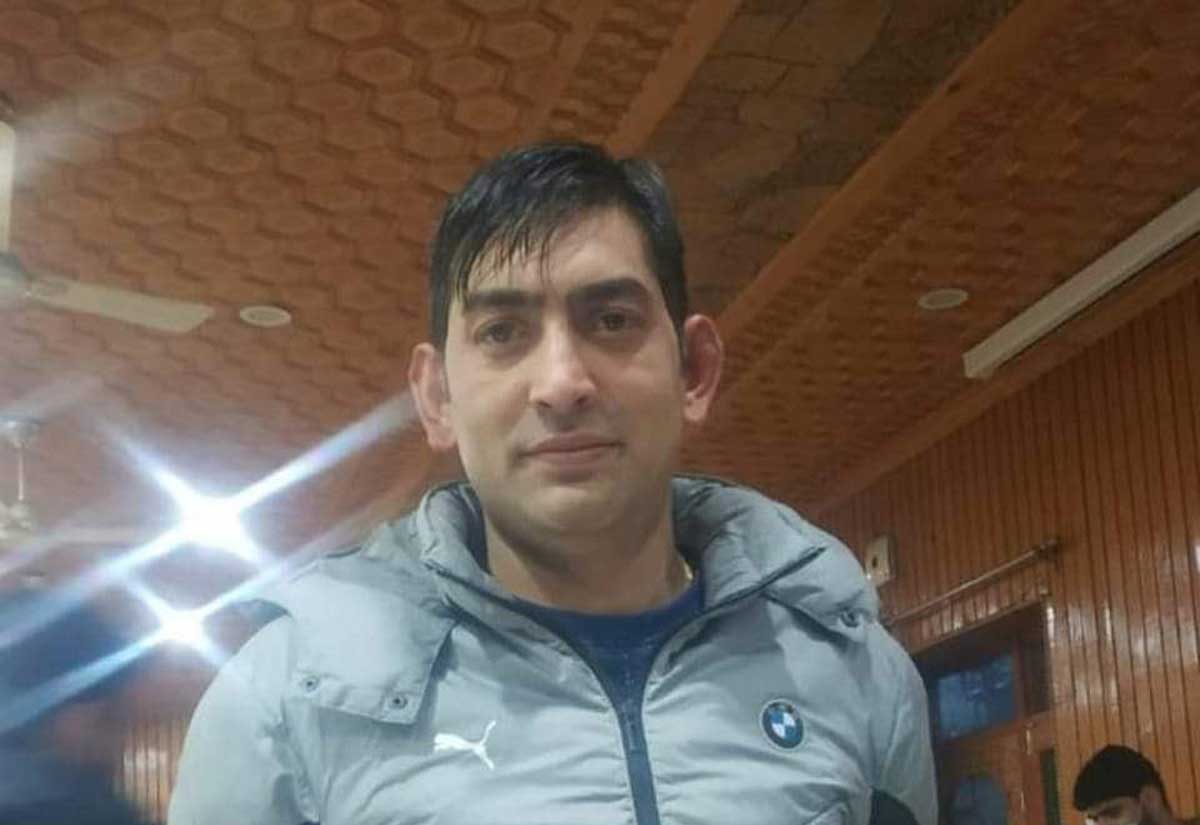
Article 370, Kashmir Files
Among KPs, the common refrain is that the ground situation after the reading down of Article 370 has deteriorated. “I had the feeling that steadily but surely a healing process had set in,” one businessman, who has been in Kashmir for more than two decades said, on the condition that he is not identified. “That process seems to have taken a hit and it is impacting the people who had availed these job offers merely because they felt they are unfit to do any other things, literally in desperation.”
Vivek Agnihotri’s The Kashmir Files movie which Prime Minister Modi endorsed as the “right perspective” on Kashmiri history has deepened the divide. “How has the film helped KPs?” said Pandita who heads the Jagti Tenement Committee, an elected body in the migrant camp, home to more than 20,000 KPs.
Tikoo, however, believes that certain sequences in the movie are true as we are witness to them but the picturization is wrong. They have portrayed all of Kashmir with the same brush as extremists and Jihadists. “Even the loyalty of Jammu Kashmir Police has been questioned,” he regretted.
Right now, Tickoo said, at least 808 families still live among locals and refused to migrate and it was a bond in the community which encouraged them to not abandon their roots and stay put. By 1992 almost 7000 families were still living in Kashmir but massacres and economic depression reduced the number to a few hundred. Official figures put the total number of KPs killed in the last 32 years at less than 240.
Tickoo believes that after the abrogation of Article 370, the mindset of the majority towards us changed. “The K-Files have deepened it. The majority of my neighbours have socially isolated me,” Tickoo said. “I did not remove Article 370 and I did not make The K Files.”















